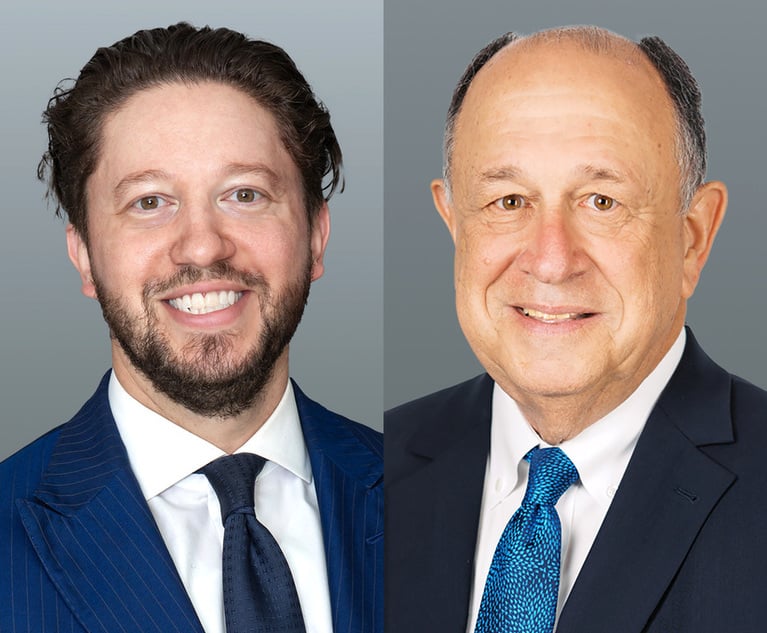Almost 2 Years After Ex-Traffic Court Judge Left Prison, Resentencing Ordered
After being free for almost two years, a federal appeals court has ruled that ex-Philadelphia Traffic Court Judge Willie Singletary's prison sentence needs to be rethought.
August 22, 2018 at 05:09 PM
4 minute read

After being free for almost two years, a federal appeals court has ruled that ex-Philadelphia Traffic Court Judge Willie Singletary's prison sentence needs to be rethought.
Singletary, like all of the other defendants caught up in the Philadelphia Traffic Court ticket-fixing scandal, escaped the government's primary fraud charges. However, he was convicted on a single charge of lying to the FBI during the 2014 trial and was sentenced to roughly two years in prison.
On Wednesday, the U.S. Court of Appeals for the Third Circuit affirmed the convictions of Singletary's colleagues on various charges, but vacated the judgment of sentence as to him. Singletary had objected to U.S. District Judge Lawrence F. Stengel's use of sentencing guidelines for obstruction of justice, arguing that his crime differed.
“The government agrees that the single count on which he was convicted does not contain all of the elements of obstruction,” Third Circuit Judge Richard Nygaard wrote in the court's opinion. “For this reason, the government agrees with Singletary that he is entitled to a remand for resentencing. Accordingly, we will vacate the judgment of sentence as to Singletary and remand to the district court for resentencing.”
Since Stengel is retiring at the end of the month, a new judge will be assigned to handle the case.
The specific effect of a new sentence on Singletary is unclear, but is likely to have little impact since he has completed both his prison term and one year of supervised release.
His lawyer, William Brennan, said he argued for different guidelines before Singletary even set foot in jail.
“I met with probation and a series of supervisors and a series of assistant U.S. attorneys during the process leading up to sentencing arguing these very points and was met with resistance,” Brennan said.
“When we filed the appeal, Judge Singletary had served his time and the government agreed with our position,” he added. “The problem is you can't return 20 months to [a] man.”
Robert Zauzmer, chief of the appeals office at the U.S. Attorney's Office in Philadelphia, said the decision was a win for the government.
“We're very pleased with the decision. The government prevailed on all of our arguments,” Zauzmer said. “We're gratified that all the convictions were affirmed.”
Tuesday's ruling upheld the convictions for former Judges Thomasine Tynes, Michael Lowry, Robert Mulgrew, along with former Traffic Court administrator William Hird and businessman Henry Alfano.
At the conclusion of the two-month Traffic Court corruption trial in the summer of 2014, the jury found Michael Sullivan, Chester County Magisterial District Judge Mark A. Bruno and Chinatown businessman Robert Moy not guilty of all charges against them, which included counts of fraud and conspiracy relating to what authorities claimed was a long-standing practice of fixing tickets for friends, family and the politically connected.
The four full-time Traffic Court judges beat the government's ticket-fixing charges, but were convicted of lying; Mulgrew, Tynes and Lowry were convicted of perjury stemming from statements made before the grand jury in the case, along with Singletary's conviction of lying to federal investigators.
Sullivan, however, was later in hot water for separate tax charges for which he was ultimately convicted. Coincidentally, an October 2015 arraignment in Sullivan's tax case came a day after the last Traffic Court case defendant, auto repair garage and strip club owner Alfano, was sentenced to three years of probation. Alfano admitted to trading pornographic videos, seafood and car repairs to former head Traffic Court Judge Fortunato Perri Sr. in exchange for fixing his friends' tickets. Perri, who has had multiple strokes and suffers from dementia, was sentenced to two years' probation.
Prior to the trial, Bucks County Senior Magisterial District Judge H. Warren Hogeland, Delaware County Senior Magisterial District Judge Kenneth Miller, and the former director of records at the Traffic Court, William “Billy” Hird, pleaded guilty to charges related to ticket-fixing.
Hogeland died in August 2013 before he could be sentenced; Miller was sentenced to one year of probation in January based on a single count of mail fraud; and Hird was sentenced to two years in prison after pleading guilty to 18 of the nearly 80 counts filed against him, including conspiracy, wire fraud, mail fraud and lying to the FBI when questioned about ticket-fixing in the court.
The Traffic Court was disbanded by the state legislature in 2013 in the wake of the scandal. Traffic cases are now handled by a division of the Philadelphia Municipal Court.
This content has been archived. It is available through our partners, LexisNexis® and Bloomberg Law.
To view this content, please continue to their sites.
Not a Lexis Subscriber?
Subscribe Now
Not a Bloomberg Law Subscriber?
Subscribe Now
NOT FOR REPRINT
© 2024 ALM Global, LLC, All Rights Reserved. Request academic re-use from www.copyright.com. All other uses, submit a request to [email protected]. For more information visit Asset & Logo Licensing.
You Might Like
View All

3rd Circuit Strikes Down NLRB’s Monetary Remedies for Fired Starbucks Workers


Phila. Judge Upholds $68.5M Verdict Over Construction Worker's Death
3 minute readTrending Stories
- 1Lawyer’s Resolutions: Focusing on 2025
- 2Houston Judge Exonerated on Appeal, Public Reprimand Vacated
- 3Bar Report - Dec. 30
- 4Employment Law Developments to Expect From the Second Trump Administration
- 5How I Made Law Firm Leadership: 'It’s Imperative That You Never Stop Learning,' Says Ian Ribald of Ballard Spahr
Who Got The Work
Michael G. Bongiorno, Andrew Scott Dulberg and Elizabeth E. Driscoll from Wilmer Cutler Pickering Hale and Dorr have stepped in to represent Symbotic Inc., an A.I.-enabled technology platform that focuses on increasing supply chain efficiency, and other defendants in a pending shareholder derivative lawsuit. The case, filed Oct. 2 in Massachusetts District Court by the Brown Law Firm on behalf of Stephen Austen, accuses certain officers and directors of misleading investors in regard to Symbotic's potential for margin growth by failing to disclose that the company was not equipped to timely deploy its systems or manage expenses through project delays. The case, assigned to U.S. District Judge Nathaniel M. Gorton, is 1:24-cv-12522, Austen v. Cohen et al.
Who Got The Work
Edmund Polubinski and Marie Killmond of Davis Polk & Wardwell have entered appearances for data platform software development company MongoDB and other defendants in a pending shareholder derivative lawsuit. The action, filed Oct. 7 in New York Southern District Court by the Brown Law Firm, accuses the company's directors and/or officers of falsely expressing confidence in the company’s restructuring of its sales incentive plan and downplaying the severity of decreases in its upfront commitments. The case is 1:24-cv-07594, Roy v. Ittycheria et al.
Who Got The Work
Amy O. Bruchs and Kurt F. Ellison of Michael Best & Friedrich have entered appearances for Epic Systems Corp. in a pending employment discrimination lawsuit. The suit was filed Sept. 7 in Wisconsin Western District Court by Levine Eisberner LLC and Siri & Glimstad on behalf of a project manager who claims that he was wrongfully terminated after applying for a religious exemption to the defendant's COVID-19 vaccine mandate. The case, assigned to U.S. Magistrate Judge Anita Marie Boor, is 3:24-cv-00630, Secker, Nathan v. Epic Systems Corporation.
Who Got The Work
David X. Sullivan, Thomas J. Finn and Gregory A. Hall from McCarter & English have entered appearances for Sunrun Installation Services in a pending civil rights lawsuit. The complaint was filed Sept. 4 in Connecticut District Court by attorney Robert M. Berke on behalf of former employee George Edward Steins, who was arrested and charged with employing an unregistered home improvement salesperson. The complaint alleges that had Sunrun informed the Connecticut Department of Consumer Protection that the plaintiff's employment had ended in 2017 and that he no longer held Sunrun's home improvement contractor license, he would not have been hit with charges, which were dismissed in May 2024. The case, assigned to U.S. District Judge Jeffrey A. Meyer, is 3:24-cv-01423, Steins v. Sunrun, Inc. et al.
Who Got The Work
Greenberg Traurig shareholder Joshua L. Raskin has entered an appearance for boohoo.com UK Ltd. in a pending patent infringement lawsuit. The suit, filed Sept. 3 in Texas Eastern District Court by Rozier Hardt McDonough on behalf of Alto Dynamics, asserts five patents related to an online shopping platform. The case, assigned to U.S. District Judge Rodney Gilstrap, is 2:24-cv-00719, Alto Dynamics, LLC v. boohoo.com UK Limited.
Featured Firms
Law Offices of Gary Martin Hays & Associates, P.C.
(470) 294-1674
Law Offices of Mark E. Salomone
(857) 444-6468
Smith & Hassler
(713) 739-1250





